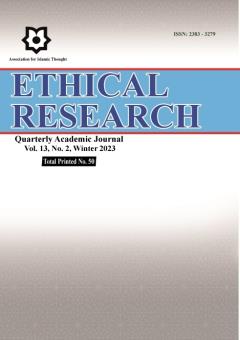Explaining the moral and legal realm of financial rights and property of couples after divorce in Iranian and French law
Subject Areas : Ethics and Islamic EducationAbolhasan Pahlevani 1 , Saleh Yamerli 2 , ali ajbar esmaeile 3
1 -
2 -
3 - Assistant Professor of Law, Department of Law, Gorgan Branch, Islamic Azad University, Gorgan, Iran
Keywords: Ethics, law, family, financial law, property halving, dowry, alimony.,
Abstract :
Today, the moral and legal realm of financial rights of couples can be studied in various jurisprudential and legal dimensions. Since ethics and law are two issues included in the legislation of each country, it can be said that these two areas are an important source of legislative policy of each country in the legislation. Hence, the financial rights and assets of the couple are formed in the direction of morality. The financial rights of couples, in their broad dimensions, include rights such as dowry, halving property, alimony, retribution, etc., each of which is applied in laws such as civil law and family protection law with a special regulation, he's got a special place. In French law, this type of law is also examined under the rules and jurisprudence. In Iranian law, according to Article 1102 of the Civil Code, by concluding a marriage contract, the rights and obligations of the couple, including the financial rights of the husband, are established against the wife, and as a result, after the dissolution of the marriage and separation, The husband is to pay alimony, to be aborted, because one of the principles and means of obligation is marriage. This issue is different in Iranian law regarding the demand for dowry and halving of property and retribution, etc., and these rights can also be demanded by terminating or dissolving the marriage contract. In French law, rights such as claiming alimony can be claimed by the wife in different circumstances, and this issue is mentioned in Articles 212, 270 and 301 of the French Civil Code, and in some respects, the division of property in this country has rules and regulations. It is special. Therefore, the purpose of writing this article is to examine the legal and moral status of financial rights and assets of couples after divorce in the law of Iran and France, which has been studied according to the library method, and as a result it can be said that financial rights and In some cases, the property of the couple has been considered in Iranian and French law and has a suitable position, and ethics has been considered as the basis of the legislative policy of these lawsuits in the judicial procedure.
امامي، سيد حسن، 1366، حقوق مدني(خانواده)، تهران، انتشارات اسلاميه، ج5.
امامی، سید حسن، 1383، حقوق مدنی، انتشارات اسلامیه، ج3.
امیر محمدی، محمد رضا،1388، حقوق مدنی(نظام مالی خانواده)، تهران، میزان.
تريز، عبدالرشيد، 1385، طلاق از ديدگاه اسلام، تهران، نشر احسان.
جعفري لنگرودي، محمد جعفر، 1386، الفارق، تهران، گنج دانش، ج3.
جلالي، سيد مهدي، 1388، اختيار زوجه در طلاق در حقوق ايران با مطالعهي تطبيقي، تهران، خرسندي.
سعدون، نای بن، 1379، حقوق زن از آغاز تا امروز، مترجم گیتی خورسند، تهران، کویر.
شهیدی، مهدی، 1390، ارث، تهران، مجد.
صفايي، سيد حسين؛ امامي، اسدالله، 1384، حقوق خانواده، تهران، دانشگاه تهران، ج1.
صفایی، سید حسین؛ امامی، اسدالله، 1388، مختصر حقوق خانواده، تهران، میزان.
کاتوزيان، ناصر، 1371، حقوق مدني خانواده، تهران، انتشار، ج1.
کاتوزیان، ناصر، 1392، قانون مدنی در نظم حقوقی کنونی، تهران، میزان.
کاتوزیان، ناصر، 1357، حقوق خانواده، تهران، دانشگاه تهران.
لطفی، اسداالله، 1393، حقوق خانواده، تهران، خرسندی.
لطفي، اسداالله، 1387، مباحث حقوقي شرح لمعه، تهران، مجد.
محقّق داماد، سيد مصطفي، 1376، حقوق خانواده، تهران، انتشارات علوم اسلامي.
احمدی، قاسم؛ احمدی، سلمان، 1394، بررسی تطبیقی طلاق در ایران و فرانسه، کنفرانس ملی چارسوی علوم انسانی.
جعفری، سوده؛ قیصریان، فرزاد، 1396، شرط تنصیف دارایی های زوج، راهکاری جهت حفظ حقوق مالی زنان، تهران، پژوهشنامه زنان، س8، ش2.
حیدری، حسن، حاجتی، منیژه؛ ابراهیمی نسب، یوسف، 1390، نفقه ی زن در حقوق ایران، فرانسه و سوئد، نشریه علمی زن و فرهنگ، س2، ش7.
دیانی، عبد الرسول، 1384، شرط تنصیف دارایی در عقد نکاح در صورت انحلال آن، تهران، مجله دادرسی، ش 53.
زحمتکش، منوچهر؛ موسوی، سید صادق، 1399، بررسی تطبیقی طبقات ارث در فقه شیعه، اهل سنت و حقوق فرانسه با رویکردی بر دیدگاه امام خمینی، تهران، پژوهشنامه متین، س22، ش86.
سادات اسدی، لیلا، 1390، بررسی تطبیقی معاضدت های مالی حین طلاق و پس از آن، ندای صادق،س16، ش54.
سادات موسوی، مریم، 1396، نحله و اجرت المثل از منظر فقه و حقوق ایران، چهارمین کنفرانس جهانی و اولین کنفرانس ملی پژوهش های نوین ایران و جهان در مدیریت، اقتصاد و حسابداری و علوم انسانی.
عابدی، محمد، صفوي شاملو، حسین، 1393، تحلیلی فقهی و حقوقی اوصاف و وضعیت شرط تنصیف اموال زوج، تهران، مطالعات فقه و حقوق اسلامی ،ش10.
وردی زاده، حمیدالله؛ قریشی، سید مهدی؛ قریشی، سید مهدی، 1396، ارث زوجه در فقه امامیه وحقوق ایران، دومین همایش بین المللی و چهارمین همایش ملی پژوهش های مدیریت و علوم انسانی.
ابن قدامه، عبدالرحمن، بی تا، الشرح الکبیر، بیروت، دارالکتب العربیه، ج9.
مامقانی، عبدالله، 1404ه.ق، مناهج المتقين، قم، مؤسسه آل البیت(ع).
محقق قمی، میرزا ابوالقاسم 1371ه.ق، جامع الشتاب، تهران، کیهان.
نجفی، محمد حسن، بی تا، جواهرالکلام، بیروت، دارالاحیاء التراث العربی، ج ۳۱.
Cf.Code civil (de francais) Art. 745-767 (DALLOZ, 110 e eedition, 2002.
Georges, Hubrecht & Georges, Vermell, 1987, Droit civil, Sirey 14e edition.
Malaurie, Philippe, Aynès, Laurent (1989). Cours de droits civile: La famille, 2em éd, Editions Cujas.
Mazeaud, Henri, Mazeaud, Léon, Mazeaud, Jean, Chabas, François (1998). Obligations: Théorie générale, Montchrestien, Paris.


